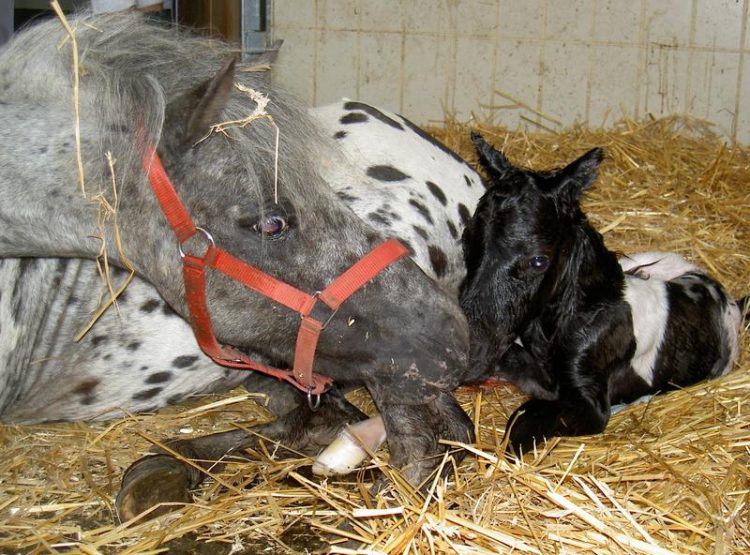Foaling mares are totally relaxed – no stress

Foaling appears to cause the opposite of a stress response. (Photo: Vetmeduni Vienna)
Scientists at the Vetmeduni Vienna have investigated the stress associated with birth in horses and other domestic animals. The findings show that contrary to expectations horse mares appear to be completely relaxed when foaling. The results are published in the Journal Theriogenology.
Foaling in horses is extremely fast. Labour and the active part of foaling, resulting in delivery of the foal, take 10 to 20 minutes and are considerably shorter than giving birth in humans or in cows. Is this brief period stressful for the animals or are horses more relaxed than humans when giving birth?
This issue has been addressed by Christina Nagel and colleagues, who closely observed 17 foalings at the Brandenburg State Stud in Neustadt (Dosse), Germany, as well as recording electrocardiograms before, during and after foaling. The researchers also took samples of saliva and blood and analysed the levels of stress hormones such as cortisol and epinephrine. As Nagel summarizes, “Normal foaling appears to cause just the opposite of a stress response”.
Cardiac and circulatory demands remain at a low level
Surprisingly, during labour the heart rate of mares does not increase. On the contrary, the mares even miss some individual heart beats due to delayed stimulus conduction in the heart. In humans, such second-degree atriventricular (AV) blocks often require medical treatment but many healthy horses show AV blocks at rest. On physical activity, e.g. when the horse is ridden, the heart beat becomes regular and the beat frequency increases. The finding of AV blocks during foaling suggests that mares are strongly influenced by the parasympathetic nervous system, which usually causes a state of rest and relaxation. Its antagonist, the sympathetic nervous system, would prepare the organism for a stress response but does not seem to be active while the animals are giving birth.
No stress during foaling
The level of stress hormones remains low in foaling mares and the researchers did not find an adrenaline rush at any point. Foaling clearly does not evoke a stress response. The need to care for the newly born foal was also not perceived as stressful: contact between the mare and the foal was associated with a further state of relief and relaxation.
Horses thus experience giving birth very differently from human mothers. They need a safe environment to give birth: all the foals in the study were born at night, when the stable was quiet. As the Head of the Research Group, Christine Aurich, explains, “Parturition in horses requires a state of relaxation in the mare. This is an advantage in wild horses because mares can postpone labour until they perceive the environment as calm and safe. Once this is the case, foaling proceeds within a very short time.”
The article “Parturition in horses is dominated by parasympathetic activity of the autonomous nervous system”, by Christina Nagel, Regina Erber, Natascha Ille, Mareike von Lewinski, Jörg Aurich, Erich Möstl and Christine Aurich has just been published in the scientific journal Theriogenology.
http://dx.doi.org/10.1016/j.theriogenology.2014.03.015
The study was conducted at the Graf Lehndorff Institute for Equine Science, a joint research unit of the Vetmeduni Vienna and the Brandenburg State Stud at Neustadt (Dosse), Germany.
About the University of Veterinary Medicine, Vienna
The University of Veterinary Medicine, Vienna in Austria is one of the leading academic and research institutions in the field of Veterinary Sciences in Europe. About 1,200 employees and 2,300 students work on the campus in the north of Vienna which also houses five university clinics and various research sites. Outside of Vienna the university operates Teaching and Research Farms. http://www.vetmeduni.ac.at
Scientific Contact:
Dr. Christina Nagel
Clinical Unit of Obstetrics, Gynaecology and Andrology
University of Veterinary Medicine Vienna (Vetmeduni Vienna)
T +43 1 250776408
christina.nagel@vetmeduni.ac.at
Released by:
Dr. Susanna Kautschitsch
Science Communication / Public Relations
University of Veterinary Medicine Vienna (Vetmeduni Vienna)
T +43 1 25077-1153
susanna.kautschitsch@vetmeduni.ac.at
http://www.vetmeduni.ac.at/en/infoservice/presseinformation/press-releases-2014/…
Media Contact
All latest news from the category: Agricultural and Forestry Science
Newest articles

Peptides on Interstellar Ice
A research team led by Dr Serge Krasnokutski from the Astrophysics Laboratory at the Max Planck Institute for Astronomy at the University of Jena had already demonstrated that simple peptides…

A new look at the consequences of light pollution
GAME 2024 begins its experiments in eight countries. Can artificial light at night harm marine algae and impair their important functions for coastal ecosystems? This year’s project of the training…

Silicon Carbide Innovation Alliance to drive industrial-scale semiconductor work
Known for its ability to withstand extreme environments and high voltages, silicon carbide (SiC) is a semiconducting material made up of silicon and carbon atoms arranged into crystals that is…





















